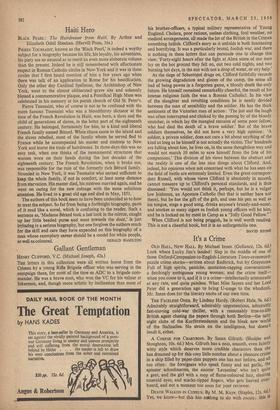Haiti Hero
BLACK PEARL: The Hairdresser from Haiti. By Arthur and Elizabeth Odell Sheehan. (Harvill Press, 16s.) PIERRE TOUSSAINT, known as the `Black Pearl,' is indeed a worthy subject for a biography because his life, his loyalty, his adventures, his piety are so unusual as to merit an even more elaborate volume than the present. Indeed he is still remembered with affectionate respect in Roman Catholic circles in New York and it was in these circles that I first heard mention of him a few years ago when there was talk of an application to Rome for his beatification. Only the other day Cardinal Spellman, the Archbishop of New York, went to the almost obliterated-grave site and solemnly blessed a commemorative plaque, and a Pontifical High Mass was celebrated in his memory at his parish church of Old St. Peter's.
Pierre Toussaint, who of course is not to be confused with the more famous Toussaint who was a bloodthirsty dictator at the time of the French Revolution in Haiti, was born, a slave and the child of generations of slaves, in the latter part of the eighteenth century. He belonged, fortunately for him, to a kind and liberal French family named Berard. When chaos came to the island and the slaves rebelled, most of the family whom he served fled to France while he accompanied his master and mistress to New York and learnt the trade of hairdresser. In those days this was no easy task, when one thinks of the monumental structures that women wore on their heads during the last decades of the eighteenth century. The French Revolution, when it broke out, was responsible for the ruin of the formerly rich Berard family. Stranded in New York, it was Toussaint who earned sufficient to keep the, whole family, if not in comfort, at least some distance from starvation. Hjs master died, his mistress married again, and he went on caring for the new menage with the same solicitous attention. He lived to a great old ago and died in May, 1851.
The authors of this book seem to have been undecided as to how to treat the subject. So far from being a forthright biography, parts of it read like a novel, which is confusing to the reader. Such a sentence as, 'Madame Berard took a last look in the mirror, caught up her little beaded purse and went towards the door,' is just irritating in a serious biography, but one forgives the authors much for the skill and care they have expended on this biography of a man whose exemplary career should be a model for white people,


































 Previous page
Previous page